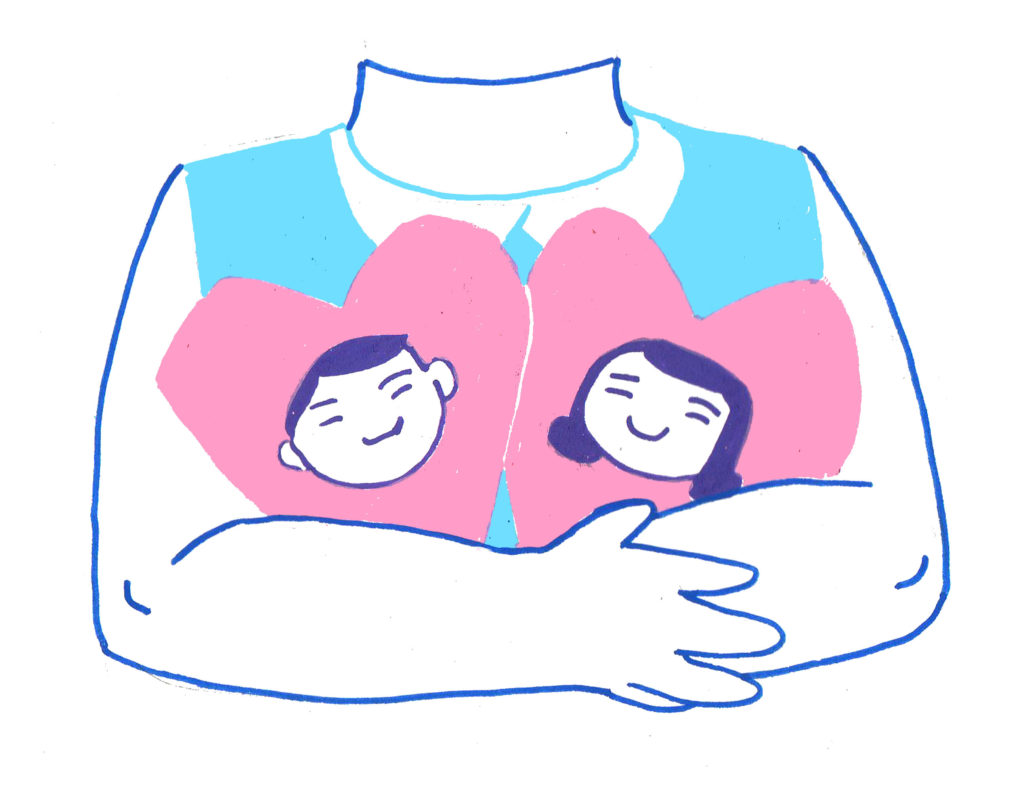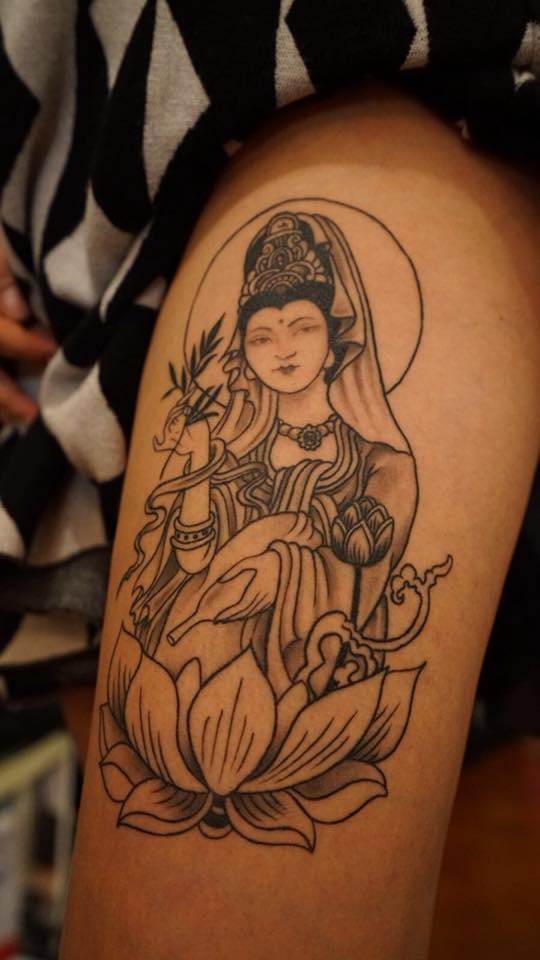Hello my dear readers, this is a new series about the Chinese observance and ritual of death: ancestor worship. I hope you enjoy it.
In 2015, Derek and I went to Taiwan for his first Chinese New Year’s celebration with my family. We arrived just before supper time, and Mama was running around in the kitchen, getting our feast ready. Since the gods and ancestors must eat before we do, as she finished preparing the food, I would bring each dish to a large round table in the altar room where Buddha, Guanyin, and our ancestors live. In the center of the room is a picture of Buddha wearing a yellow robe under the Banyan tree, a golden statue of Guanyin, and our ancestors are next to them, represented by a wooden plaque in a glass case.
While Mama was cooking up a storm in the kitchen, I sat in the bone-crushingly hard cherry wood sofa in the living room, mindlessly tapping on my phone. Derek walked into the living room, his nose crinkling, “Oh man, that food smells amazing!” He exclaimed. After a moment of pause, he asked, “why aren’t you in the kitchen helping Mama?”
“Oh, she’ll holler when she needs help carrying the dishes to the altar,” I said without looking up.
“But don’t you want to learn what she’s making?” He asked.
I turned my attention to Derek, this handsome man with twinkling blue eyes I was about to marry. Honestly, the thought of cooking with Mama had never crossed my mind. What business do I have in the kitchen? I would only get in her way. Besides, he was the cook in our family. But then again—if I don’t learn what Mama knows now, her knowledge will go when she goes. I pushed away this morbid thought. It’s not that I didn’t want to learn, but by learning, I am acknowledging her mortality.
The first time I was reminded of my mother’s mortality was at the funeral of my maternal grandmother. During the service, I sat next to Mama in the front row, my nose twitched at the sharp sting of the formaldehyde. While the monk chanted, Mama was heartbroken and bawling her eyes out. I gave her my hand to comfort her. She clutched it so hard my knuckles turned white. At that moment, I thought about the day I would have to cremate my mother—who is going to offer me their hand when that day comes? I hate having to think about the day when Mama will no longer be with us. But, I stood up anyway and walked towards the kitchen.
“You are right. I should learn so I can cook for you.” I smiled at him.
By the time I got there, Mama had finished cooking. “Okay, start bringing the dishes to the altar,” she instructed as she wiped her hands on a towel.
I was too late to learn anything.
Before we eat, we say our prayers with three burning incenses. First, out the window, praying to the Jade Emperor, the Zeus-like deity in the Chinese folk religion. Then, we pray to Buddha and Guanyin, and finally, the ancestors. After the prayer, we place each incense in their respective pots, one of the Jade Emperor, one for Buddha and Guanyin and the final one for the ancestors. When the incenses are burnt about halfway, Mama tosses two moon-shaped wooden blocks while asking if the ancestors were happy with their meal. If the blocks land in two opposite directions, it meant they were satisfied. We could then bring the dishes to the dining room and start eating.

In the Taiwanese tradition, like many Chinese speaking communities in southern China, the veneration of ancestors, or ancestor worship, is a significant ritual in the Chinese folk religion. It is how Chinese people understand and deal with death. When our parents pass away, they join the older generations of the family and become gods. It is the responsibility of the younger generation to remember our parents, our roots while asking for their blessings. The values of ancestor worship can be traced back to the Confucius concept of filial piety, the virtue of respecting one’s parents and elders by submitting to them. Not only do we love and obey our parents while they are with us, but we also continue to honor them in the afterlife with daily prayers and offerings. On special occasions, such as Chinese New Year’s, the offerings are more elaborate.
On the first day of the New Year, my family always continue to worship our ancestors. First thing in the morning, we would visit the temple to worship Ama’s family. Then we head to the cemetery, where my parental grandfather, my Agon, had purchased the mausoleum for his family and descendants. Derek and I got up early to help my parents load up the car with offerings, which consisted of fresh fruit, candies, and bottled tea. Then, we would stop by a flower stall and pick up freshly cut white Chrysanthemum, a gift to our ancestors.
The temple where we keep Ama’s family’s ashes is a short distance from Taichung. Most families only worship one set of ancestors, as the responsibility gets passed down by the oldest son in the household. However, my family is unique. Based on what I gathered, Ama’s family moved to Vietnam to pursue wealth and fortune when she was an infant. They only took the older boys with them, leaving Ama and her two older sisters behind in Taiwan. It seemed unthinkable for people nowadays to leave their children. But back then, the journey on a boat to Vietnam would be treacherous with young children. Ama’s parents decided to keep the boys, who carry the family name and gave their three daughters away. A childless widow adopted Ama who raised her with love and kindness. Ama claimed that the reason she chose to be with Agon, a married, wealthy doctor, was to have the means to take care of her aging adopted mother.
When her adopted mother passed away, Ama, as her only child, took on the responsibility to worship her. Ama also worshipped her adopted grandmother, who doted on her, as well as her ancestors. Their ashes are kept at the columbarium next to the temple. Now that Ama is getting older and less mobile, it’s Baba and Mama who make the trip to venerate Ama’s ancestors. Since 2012, when I moved to Hong Kong, I would join them on every Chinese New Year’s. And now, Derek also participates in the ritual.
The temple was destroyed by the “921 Earthquake” in 1999, and in its place are some temporary structures. Before the earthquake, it was a beautiful place— a broad, concrete staircase led to the grand temple, the railings on both sides are in the shape of dragons. One dragon was blue, and the other was red. As I walked down the stairs with my hand trailing down the back of the dragon, I felt the grooves of its scales. The sculptor painstaking painted each scale of the dragon in the hue of vivid sapphire. At the bottom of the stairs, the dragons had their mouths wide open, revealing their sharp teeth and blood-red tongue. There was also a garden on the grounds where my brother Davis and I used to play with our cousins, chasing each other around near the pond where koi fish swam in lazy circles, surrounded by luscious tropical plants.
In the year 2018, there are no remnants of its former beauty and magnificence. The temple raised funds to rebuild it, but somehow it never got finished. On the top of the hill where the temple once stood is a half-built structure, an abandoned construction project. Currently, the temple and columbarium are housed in flimsy, make-shift structures, though the earthquake took place almost twenty years ago.
The next post will illustrate the rest of the ancestor worship process. Have you been to a columbarium before? It’s super creepy but cool at the same time.








